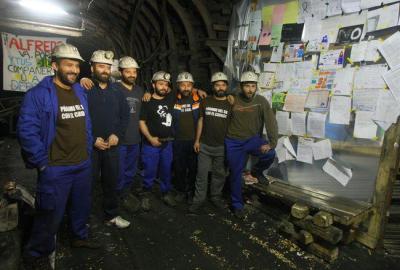By Adam Ford
|
|
Spanish miners are now a month into action against the Popular Party government, and behind them the international banking aristocracy, as they demonstrate against 60% cuts in subsidies, which are expected to result in the loss of 40,000 jobs.
Spain is a social and political powder keg, with record 24% unemployment being exacerbated by austerity measures dictated by representatives of high finance. Even when Franco’s political heirs in the PP were brought to power by a collapse in support for the Socialist Workers’ Party last autumn, the markets immediately put them on notice that enormous cuts were expected. Just this week, Prime Minister Mariano Rajoy has agreed terms for a €100 billion bailout, making Spain the fourth country to require this following a banking collapse.
An indefinite mining strike began on 31st May, and two sets of mining crew immediately began a workplace sit-in, in dangerous and unsanitary conditions. Over the weeks, there have been many reports of cops charging into pit towns like invading armies, and often being held-off or deterred by the miners’ use of improvised rockets and road blocks.
Events described by the Internationalist Communist Tendency reported at the start of the month have proved typical in this regard :
“The day before yesterday (June 6) the Spanish Civil Guard was decisively repulsed and driven back into Ciñera de Gordon, a small town about halfway between Oviedo and Leon. They had arrived in force on Tuesday to clear a roadblock on highway N-630 near the village wedged between the mountains of Asturias, between Oviedo and Leon. But they did not have to wait long for a response from the miners. Taking up their shields once again and supported by the inhabitants of the village, they launched an assault on the Civil Guard which was driven from the town centre. After a heavy crackdown, with mad chases through residential areas and in the surrounding countryside, a veritable manhunt, the bourgeois forces of order finally decided to leave because of the resistance on all sides from, both the motorway to the edges of the town. Their flight was celebrated with a long applause from the local population who thus expressed solidarity with this group of miners, proletarians in struggle.”
|
|
At 150 million euros, the subsidy cuts amount to a tiny fraction of the €27 billion slashed from the national budget in April. For this reason, the nightmare plaguing the ruling class is practical solidarity between other workers and the miners. The trade unions have dutifully played their part in trying to isolate the miners’ struggle by calling miner-only demos and asking the government to draw up a new ‘plan for coal’, rather than calling out all workers against all cuts.
Typical of this reactionary reformist approach were the words of General Workers Union general secretary José Angel Fernandez Villa, when he called for a “monitoring committee” to hear new mining industry proposals, and bemoaned the fact the government was “encouraging radicalisation” of the dispute by refusing to hold meaningful talks on the issue.
The trade unions would gratefully grasp the slightest concession, which they would then try to sell as a victory to their memberships. But the government is concerned that this would embolden other workers coming into struggle, and is therefore using force wherever it can to beat – and perhaps eventually starve – the miners into submission.
Like the year-long UK miners strike of the 1980s, this Spanish conflict looks like it could set a pattern for years to come.


There were general strikes in solidarity in the comarcas mineros, in Asturias, Leon, Teruel and Palencia on the 18th June, fair enough they were just one day strikes. The other strikes which were ongoing in Asturias when the miners strike started, the transport and the occupation in the Thyssen factory, got settled quickly by the employers. Don’t know if that was a result of political pressure to stop the strike spreading or not.
Although it is good to see the miners getting so much solidarity, it is problematic that there is a certain expectation on them to win for the whole class. It would be very useful to look at how this struggle is linking up with others (15-M in Madrid, for example) and what stops it linking up more, and what is stopping other sectors of workers from fighting so militantly, given the severity of the situation they are in.
LikeLike